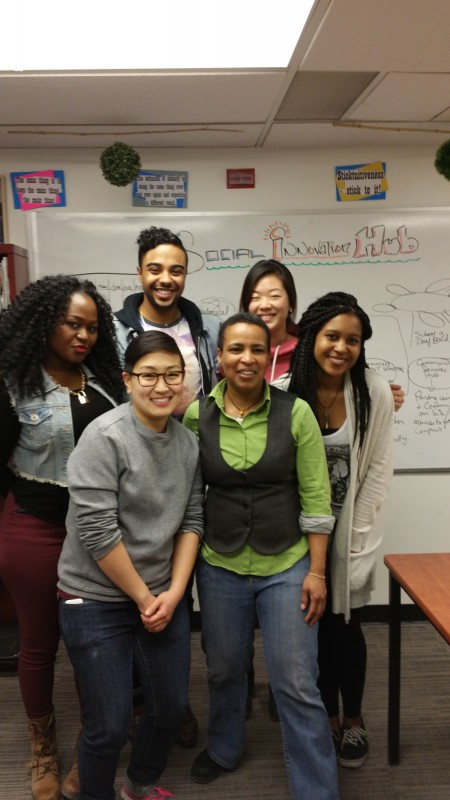New program provides students the opportunity to make a difference in their communities

The Social Innovation Hub team
(Left to right): Rodelle Sulunteh, Aya Tomioka, Natalie Wood, Jillian Greyson, Victoria Sircar, Stefan Fernandes
Photo: Marc Ragusa/The Dialog
George Brown College’s (GBC) social innovation hub is a new program with a focus on social enterprise.
The hub was founded in Oct. 2014, by two faculty members, Natalie Wood and Zuby Saloogie, both professors in the school of social and community services.
It presents an opportunity for students to develop enterprises dedicated to social change and economic justice.
The first launch was from Oct, 2014 until June 2015, and it will run again this coming September. The first participants in the social innovation hub are from the social service worker program and students from the child and youth care program will get a turn next winter.
Part of the program’s objective is to teach new skills, and Stefan Fernandes, a student in the social service worker program said, “my experience has been really positive from beginning to end. It’s very self-directed.”
“I learned how to edit videos, which I never would have learned outside this program. I also got to attend social enterprises through my social enterprise course, which was a perquisite for the hub,” said Victoria Sircar, also a social service worker student. “I also got to see enterprises like CAMH’s (Centre for Addiction and Mental Health) Out of this World Cafe, and Lemon and Allspice.”
She added, “it was a great experience. More people should know about the different types of enterprises in our communities that provide employment opportunities for the differently abled.”
The program also aims to get students out into the community and expose themselves to diverse backgrounds by providing alternative placement opportunities and supports to students as they gain new experience.
“Working with the school board we saw different kinds of social enterprises. We were consulting and helping students with developmental disabilities that were running social enterprises,” said Jillian Greyson, a social service worker student. “In terms of stigma, students with developmental disabilities are perfectly capable. They were in charge of their business, providing their products or services to their community. They built their skills and had something to show for it”.
“Seeing all these students it was a learning experience for each of us, being a social worker, you’re gonna work in a lot of different neighbourhoods, and just getting to build that rapport, it’s really inspiring to see,” said Rodelle Sulunteh, a social service worker student . “Don’t let your ability or disability limit where you need to be.”
The project, having recently been launched still has plenty of room for further development, and Aya Tomioka, a child and youth worker student, says, “it could go anywhere right now. It’s based on placement models, limited to a four month period. It was originally intended as an alternative placement program. There could be mentorship opportunities, alumni connections. Child and youth worker is still in the growing process, but has a lot of potential.”
The idea behind social enterprises is unique as it considers the individuals it impacts, a priority not just profit based as opposed to a more traditional business.
The success achieved is a more sustainable and empowering nature, as those involved aim to really make a difference in their communities.

